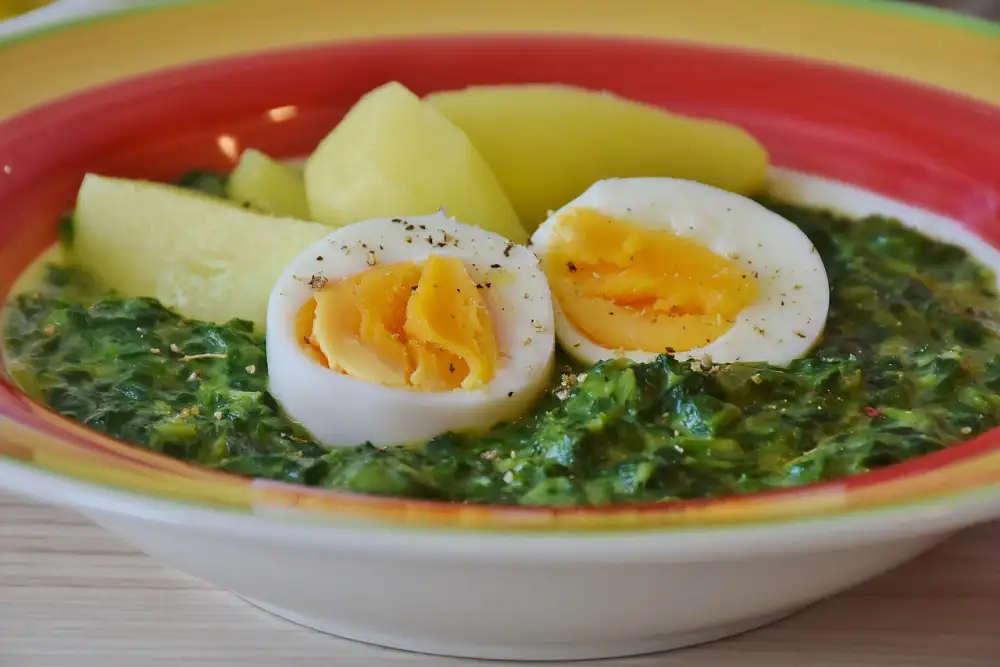Power Up Your Health with High Protein Vegetarian Foods: Discover Delicious Plant-Based Protein Sources

- Understanding the Importance of Protein in a Vegetarian Diet
- Top High Protein Vegetarian Foods for a Balanced Diet
- Lentils and Legumes: A Powerhouse of Protein
- Quinoa: A Complete Protein Source
- Greek Yogurt: A Protein-packed Dairy Option
- Tofu and Tempeh: Plant-based Protein Alternatives
- Nuts and Seeds: Nutrient-dense Protein Sources
- Incorporating High Protein Vegetarian Foods into Everyday Meals
- Protein-rich Salads and Buddha Bowls
- Hearty Vegetarian Soups and Stews
- Protein-packed Vegetarian Stir-fries and Curries
- Delicious High Protein Vegetarian Snacks
- Tips for Maximizing Protein Absorption in a Vegetarian Diet
A common misconception is that vegetarian diets lack sufficient protein. However, with the right knowledge and choices, vegetarians can easily meet their protein needs while enjoying a variety of delicious plant-based foods. High protein vegetarian foods offer numerous benefits, including improved muscle strength, enhanced weight management, and reduced risk of chronic diseases. By incorporating these nutrient-rich options into your diet, you can power up your health and find happiness in every dish you create.
Understanding the Importance of Protein in a Vegetarian Diet
Protein is an essential nutrient that plays a crucial role in maintaining overall health and well-being. It is especially important for vegetarians, as they rely solely on plant-based sources for their protein intake. Protein is responsible for building and repairing tissues, producing enzymes and hormones, and supporting a healthy immune system.
Adequate protein consumption is vital to ensure proper growth and development, especially in children and teenagers. It also helps maintain muscle mass, which becomes increasingly important as we age. Additionally, protein aids in weight management by increasing satiety and reducing cravings.
While some may argue that it's challenging to meet protein requirements on a vegetarian diet, there are numerous high-protein plant-based options available. By incorporating these foods into their meals, vegetarians can easily fulfill their protein needs while enjoying a variety of delicious dishes.
Top High Protein Vegetarian Foods for a Balanced Diet
a. Lentils and Legumes: A Powerhouse of Protein
Lentils and legumes are excellent sources of plant-based protein. They are not only rich in protein but also packed with fiber, vitamins, and minerals. Incorporate lentils into soups, stews, or salads for a hearty and nutritious meal.
b. Quinoa: A Complete Protein Source
Quinoa is a complete protein source as it contains all nine essential amino acids. It is versatile and can be used as a base for salads, stir-fries, or even as a substitute for rice in various dishes.
c. Greek Yogurt: A Protein-packed Dairy Option
Greek yogurt is an excellent dairy option for vegetarians looking to increase their protein intake. It is high in protein, calcium, and probiotics that promote gut health. Enjoy it as a snack or use it as a topping for smoothies or desserts.
d. Tofu and Tempeh: Plant-based Protein Alternatives
Tofu and tempeh are popular plant-based protein alternatives that can be used in various dishes. They are both made from soybeans and provide a good amount of protein along with other nutrients like iron and calcium.
e. Nuts and Seeds: Nutrient-dense Protein Sources
Nuts and seeds like almonds, walnuts, chia seeds, and hemp seeds are nutrient-dense sources of plant-based protein. They can be added to salads, oatmeal, or enjoyed as snacks to boost your daily protein intake.
Incorporating these high protein vegetarian foods into your diet will ensure you meet your nutritional needs while enjoying delicious meals that support your health goals.
Lentils and Legumes: A Powerhouse of Protein
Lentils and legumes are a powerhouse of protein, making them an essential part of a high protein vegetarian diet. These plant-based foods are not only rich in protein but also packed with fiber, vitamins, and minerals. Lentils, chickpeas, black beans, and kidney beans are just a few examples of legumes that can provide a significant amount of protein per serving. Incorporating lentils and legumes into your meals can help you meet your daily protein needs while enjoying delicious and nutritious dishes.
Quinoa: A Complete Protein Source
Quinoa, pronounced as "keen-wah," is a versatile grain that packs a powerful protein punch. Unlike most plant-based proteins, quinoa is considered a complete protein source, meaning it contains all nine essential amino acids that our bodies need but cannot produce on their own. This makes it an excellent choice for vegetarians looking to meet their protein needs. With approximately 8 grams of protein per cooked cup, quinoa can easily be incorporated into various dishes like salads, stir-fries, and even breakfast bowls. Its nutty flavor and fluffy texture make it a delightful addition to any meal.
Greek Yogurt: A Protein-packed Dairy Option
Greek yogurt is a popular choice for those seeking a high protein vegetarian option. Not only is it delicious, but it also packs a powerful protein punch. With approximately 17 grams of protein per serving, Greek yogurt provides a substantial amount of this essential nutrient. It is also rich in calcium, which is important for maintaining strong bones and teeth. Additionally, Greek yogurt contains probiotics that promote healthy digestion and boost the immune system. Whether enjoyed on its own or used as a base for smoothies, parfaits, or dressings, Greek yogurt is a versatile and nutritious addition to any vegetarian diet.
Tofu and Tempeh: Plant-based Protein Alternatives
Tofu and tempeh are excellent plant-based protein alternatives for vegetarians. Tofu, made from soybeans, is a versatile ingredient that can be used in various dishes. It is low in calories and contains all essential amino acids, making it a complete protein source. Tempeh, on the other hand, is made from fermented soybeans and has a nutty flavor. It is rich in fiber and packed with protein. Both tofu and tempeh can be grilled, stir-fried, or added to salads to boost your protein intake while enjoying delicious vegetarian meals.
Nuts and Seeds: Nutrient-dense Protein Sources
Nuts and seeds are not only delicious but also packed with essential nutrients, including protein. Almonds, walnuts, cashews, and pistachios are excellent sources of plant-based protein. They can be enjoyed as a snack or added to salads, stir-fries, or baked goods for an extra protein boost. Chia seeds, flaxseeds, and hemp seeds are also rich in protein and provide healthy fats and fiber. Sprinkle them on top of smoothies, yogurt, or oatmeal to increase your daily protein intake. Incorporating nuts and seeds into your diet is a simple and tasty way to power up your health with high-quality vegetarian protein.
Incorporating High Protein Vegetarian Foods into Everyday Meals
Incorporating high protein vegetarian foods into everyday meals is a great way to ensure a balanced diet. Protein-rich salads and Buddha bowls are not only delicious but also provide a variety of nutrients. Hearty vegetarian soups and stews can be packed with lentils, legumes, and quinoa for a satisfying meal. For a quick and easy option, try making protein-packed vegetarian stir-fries and curries using tofu or tempeh as the main protein source. And don't forget about delicious high protein vegetarian snacks like roasted nuts and seeds. With these ideas, you can easily power up your health with plant-based protein sources in every meal!
Protein-rich Salads and Buddha Bowls
Protein-rich Salads and Buddha Bowls are a fantastic way to incorporate high protein vegetarian foods into your diet. Start with a base of leafy greens like spinach or kale, then add in protein-packed ingredients such as chickpeas, quinoa, and tofu. Top it off with a variety of colorful vegetables like bell peppers, tomatoes, and cucumbers for added nutrients. Drizzle with a homemade dressing made from Greek yogurt or tahini for an extra boost of protein. These salads and bowls are not only delicious but also provide the necessary nutrients to power up your health.
Hearty Vegetarian Soups and Stews
Hearty Vegetarian Soups and Stews are not only comforting and delicious but also a great way to incorporate high protein vegetarian foods into your diet. Lentils, beans, and chickpeas are excellent sources of protein that can be added to soups and stews for a nutritious boost. Try making a hearty lentil soup with vegetables or a spicy chickpea stew with tomatoes and spices. These dishes not only provide ample protein but also offer a variety of vitamins, minerals, and fiber. So grab your soup pot and get creative with these protein-packed vegetarian recipes!
Protein-packed Vegetarian Stir-fries and Curries
Stir-fries and curries are not only delicious, but they can also be a great way to incorporate high protein vegetarian foods into your diet. By adding protein-rich ingredients like tofu, tempeh, and legumes, you can create hearty and satisfying meals that will keep you energized throughout the day.
Tofu is a versatile ingredient that absorbs flavors well and provides a good amount of protein. You can marinate tofu in soy sauce or spices before stir-frying it with vegetables for a quick and nutritious meal. Tempeh, made from fermented soybeans, has a nutty flavor and is packed with protein. It can be added to curries along with vegetables for a filling and satisfying dish.
Legumes such as chickpeas, black beans, and lentils are also excellent sources of plant-based protein. Adding them to stir-fries or curries not only increases the protein content but also adds texture and fiber to the dish. You can cook them beforehand or use canned varieties for convenience.
To enhance the flavors of your stir-fries and curries, don't forget to use aromatic spices like cumin, turmeric, ginger, and garlic. These spices not only add depth but also provide additional health benefits.
By incorporating these high protein vegetarian foods into your stir-fries and curries, you can create flavorful meals that are both nourishing and satisfying. Experiment with different combinations of vegetables, proteins, and spices to discover new favorite recipes that power up your health while tantalizing your taste buds.
Delicious High Protein Vegetarian Snacks
When it comes to satisfying your hunger between meals, high protein vegetarian snacks are the way to go. Not only do they keep you full and energized, but they also provide essential nutrients for your body. Here are some tasty options to try:
1. Roasted chickpeas: These crunchy little bites are packed with protein and fiber. Simply toss them in olive oil, sprinkle with your favorite spices, and roast until crispy.
2. Greek yogurt with berries: Creamy Greek yogurt is not only a great source of protein but also calcium. Top it off with fresh berries for a burst of antioxidants and natural sweetness.
3. Edamame: These young soybeans are not only fun to eat but also rich in protein and fiber. Boil or steam them and sprinkle with sea salt for a nutritious snack.
4. Peanut butter apple slices: Spread some natural peanut butter on apple slices for a delicious combination of protein, healthy fats, and fiber.
5. Hummus and veggie sticks: Whip up a batch of homemade hummus using chickpeas, tahini, lemon juice, garlic, and olive oil. Serve it with carrot sticks, cucumber slices, or bell pepper strips for a satisfying snack.
6. Cottage cheese with tomatoes: Cottage cheese is a low-fat dairy option that is high in protein. Pair it with sliced tomatoes for a refreshing and nutritious snack.
These high protein vegetarian snacks are not only tasty but also easy to prepare. Incorporate them into your daily routine to keep hunger at bay while nourishing your body with essential nutrients.
Tips for Maximizing Protein Absorption in a Vegetarian Diet
1. Combine plant-based proteins: Pairing different sources of vegetarian protein can enhance their amino acid profile and improve absorption. For example, combining lentils with quinoa or tofu with brown rice creates a complete protein source.
2. Include vitamin C-rich foods: Vitamin C aids in the absorption of iron, which is essential for vegetarians who rely on plant-based sources for this mineral. Add citrus fruits, bell peppers, and leafy greens to your meals to boost iron absorption.
3. Soak and sprout legumes: Soaking and sprouting legumes like chickpeas and mung beans can increase their nutrient content and reduce anti-nutrients that hinder protein absorption. This simple step also improves digestibility.
4. Use fermentation techniques: Fermented foods like yogurt, tempeh, and sauerkraut contain probiotics that promote gut health and aid in nutrient absorption. Incorporate these fermented options into your meals regularly.
5. Cook vegetables properly: Some vegetables contain compounds that inhibit protein digestion. Cooking them thoroughly can break down these compounds, making the protein more accessible to your body.
6. Avoid excessive caffeine and alcohol: Both caffeine and alcohol can interfere with nutrient absorption, including protein. Limit your intake of these substances to ensure optimal utilization of the protein you consume.
By following these tips, you can maximize the benefits of high protein vegetarian foods by enhancing their absorption in your body, leading to improved overall health and well-being.
In conclusion, incorporating high protein vegetarian foods into your diet can have numerous benefits for your overall health and well-being. By understanding the importance of protein in a vegetarian diet and exploring the various plant-based protein sources available, you can power up your health and discover delicious ways to meet your protein needs.
From lentils and legumes to quinoa and Greek yogurt, there are plenty of options to choose from that provide a substantial amount of protein. Tofu, tempeh, nuts, and seeds also offer great alternatives for those looking to increase their plant-based protein intake.
By incorporating these high protein vegetarian foods into everyday meals such as salads, soups, stir-fries, and snacks, you can ensure that you are getting the necessary nutrients while enjoying delicious flavors. Remember to maximize protein absorption by combining different sources of plant-based proteins and consuming them with vitamin C-rich foods.
Embrace the power of high protein vegetarian foods and experience the joy of creating nutritious dishes that not only taste great but also support optimal health. Start exploring these plant-based options today and unlock a world of culinary possibilities while nourishing your body from within.
Published: 10. 12. 2023
Category: Health



